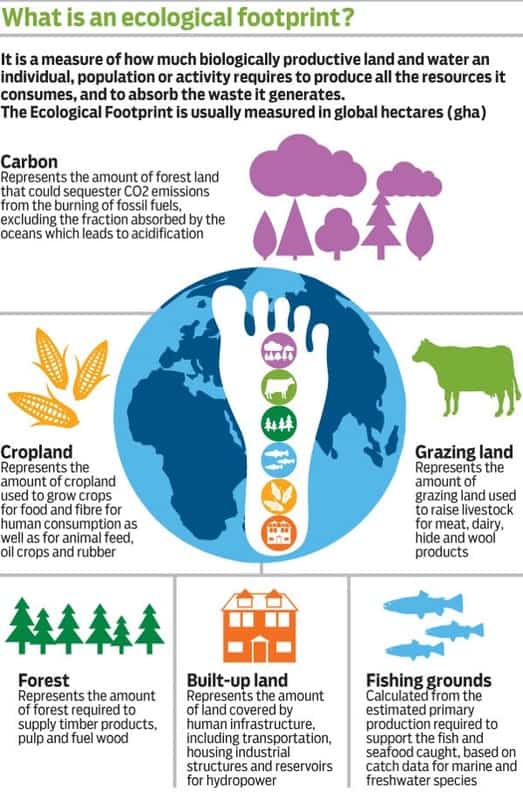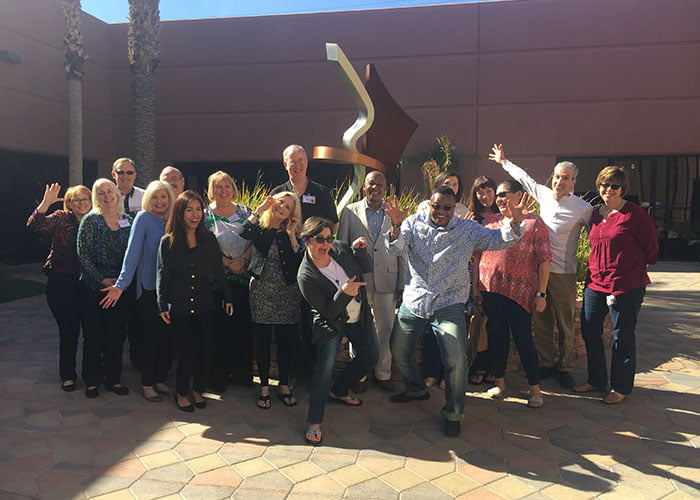“You are not Atlas carrying the world on your shoulder. It is good to remember that the planet is carrying you.”
— Vandana Shiva
What is the Earth’s Carrying Capacity?
Sometimes, simplifying complex issues is a fast way to understanding them better. To illustrate with the Earth’s Carrying Capacity: there’s a limit to the number of people and species that our beautiful, bountiful planet can support – without degrading its environment. If you are called to learn more about carrying capacity, you might want to explore the mathematics, theory, and so much more on the subject.
Reflecting on Vandana Shiva’s quote above, it’s remarkable to see how she has flipped a paradigm from one of burden to one of benefit — as in what might we do to benefit the planet? In Appreciative Inquiry, we know how important it is to shift paradigms as part of inspiring transformative change.
A Tool for a New Paradigm: Our Ecological Footprint
 How might we best explore a paradigm that focuses on what we might we do to benefit the planet? Here’s where the Ecological Footprint is helpful. It measures the quantity of nature it takes to support people and their economies. The concept was first presented in the 1990s and considers how much land and resources are required to support lifestyles and consumption patterns.
How might we best explore a paradigm that focuses on what we might we do to benefit the planet? Here’s where the Ecological Footprint is helpful. It measures the quantity of nature it takes to support people and their economies. The concept was first presented in the 1990s and considers how much land and resources are required to support lifestyles and consumption patterns.
The Ecological Footprint helps us identify ways to reduce our impact on the environment, and that is one part of a solution. However, a “benefit” paradigm also encourages us to ask how might we restore what we consume. To do this, we might recall times when we have made other changes in our personal lives or organizations that were new ways of being and doing. What motivated us to make those changes? How did we know where to direct our efforts? Who helped us persevere?
Through these high-point experiences we’re better able to dream a vivid picture of how our choices and actions might benefit the planet. What might help us stretch the realm of the status quo, challenge assumptions or routines, and suggest real possibilities that environmental stewardship is an everyday reality? It might be: The Global Economy Benefits the Planet that Supports Our World or another provocative proposition made by possible by our aspirations and endless imagination.
Image Source
What’s Happening Now?
Innovation and change is happening! Improvements are being made in Sustainable Agriculture, Renewable Energy, the Circular Economy, and Green Building practices. Business leaders are recognizing that their businesses can be used as a force for good as demonstrated by Certified B Corps, Sustainable Brands and Conscious Capitalism. Awareness tends to generate greater awareness, so looking for innovation and change – even in fledgling or small doses — creates momentum for more positive transformation.
What’s Next?
It’s challenging to predict the future; it’s more impactful to create it. Here are some questions from the Encyclopedia of Positive Questions that might assist you in appreciatively inquiring into what might be next in your part of the world:
- Talk about a time you felt a profound connection to nature. What was that like? What did you learn from that experience?
- When have you been a part of or seen an organization or community do something positive for the environment? Who was involved? What do you appreciate most about these people and this work?
- What two things would you like an organization or community to do that would benefit the environment?
- Imagine life fifty years into the future. All of our pressing environmental issues have been solved. Perhaps cars are made of a soybean-based plastic and run on solar power, nuclear waste can be broken down into harmless elements, and deforestation has been reversed. What role did this organization or community play in helping to build this healthy world?
Kelly Stewart is a certified Appreciative Inquiry Facilitator and Conversations Worth Having Trainer. In addition to her work with both organizations, she is founder of The Positive Business, facilitating strategic conversations rooted in Appreciative Inquiry, believing deeply that better results begin with better conversations.


Add your comment now using your favorite social account or Click Here To Login
